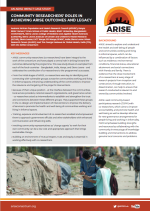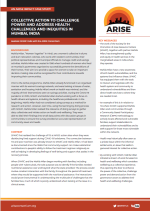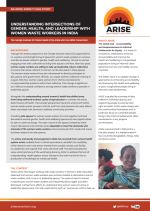Systems of Waste: Documentaries exploring the lives of sanitation workers and waste pickers in India
Earlier this year our partner, The George Institute, India, created a series of short documentaries as part of the ARISE project. These films explore the lives and experiences of garbage collectors, sanitation workers and waste pickers, and their significance in the context of sanitation and public health. The films were produced in English and local […]
ARISE aimed to explore and understand the health and well-being of people and communities working and living in informal spaces, which can be influenced by a combination of factors such as residence, environmental conditions, financial status, educational attainment and social connections with friends and family. There is evidence that the close involvement of co-researchers at […]
Mahila Milan, “Women Together” in Hindi, are a women’s collective in slums and slum relocation colonies, who work with resident communities, their political representatives and municipal officials to manage credit and savings activities. Mahila Milan was created in 1986 when hundreds of women who lived on Mumbai’s pavements organised to successfully prevent the demolitions of […]
Through the ARISE programme, the George Institute India (TGI) supported the co-creation and strengthening of spaces for women waste workers to convene and discuss issues related to gender, health and wellbeing. This led to women engaging more with collectives to bring their issues to the fore. After four years, women waste workers are willing to […]
In this interesting, new video learn about the program run by an alliance of SPARC, National Slum Dwellers Federation and Mahila Milan (a women’s savings collective) to support program those with TB and their families. This work was undertaken as part of the ARISE consortium’s work in India.
Waste workers-otherwise known as sanitation workers-are often made invisible due to informal work arrangements. In India, as in other parts of the world, sanitation workers tend to be from the oppressed and marginalized communities with little access to healthcare and quality health services. This despite, their work being highly important to society and exposing them […]
Waste pickers in India are extremely vulnerable to a range of health problems due to their poor living and unsafe working conditions, and struggle to access the health services they are entitled to. This research uses a community-based participatory research and focuses specifically on vector-borne diseases in two districts of Andhra Pradesh, exploring how they […]
Worldwide, infrastructure expansion and visions of ‘slum-free cities’ displace people living in informal settlements. Without community participation in these processes and accountability mechanisms in place’ such displacement can adversely impact people’s health and well-being. This piece outlines SPARC’s (Society For Promotion of Area Resource Centres, SPARC is an NGO based in India promoting action of […]
Waste pickers in India are extremely vulnerable to a range of health problems due to their poor living and unsafe working conditions, and struggle to access the health services they are entitled to. This research uses a community-based participatory research and focuses specifically on mosquito-borne diseases in two districts of Andhra Pradesh, exploring how they […]
Please turn on closed captions for subtitles on this video! The ARISE team in India organised an exchange between the waste workers in Shimla and Vijaywada and the alliance of SPARC, NSDF and Mahila Milan. Supported by ARISE and funded by GCRF, a group of waste workers, both men and women, from Shimla and Vijaywada […]









